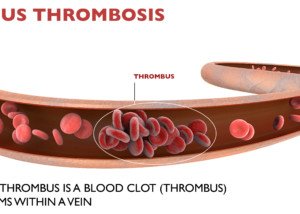A doctor answers the question if compression socks or stockings can trigger dislodging of a DVT.
Compression socks or stockings are well-known to people who have a medical condition that causes fluid retention in their legs.
This may be liver disease, kidney disease, or much more commonly, chronic heart failure.
The compression socks help push the backed-up fluid upward. Plus, they can reduce the discomfort that’s caused by the edema.
A person who has a medical condition that would cause enough fluid back-flow in the legs to necessitate the need for compression stockings is also a person who has a DVT risk that’s higher than that of the average population.
Complicating the issue is that if both of the patient’s legs are quite swollen at any given time, the swelling that’s caused by a deep vein thrombosis will not be as obvious as it would be in a normal leg.
And not all deep vein thromboses turn a leg red, hot or cause a calf cramp.
“Contrary to what most people believe, movement in general does not trigger a DVT to dislodge,” says Paul Lucas, MD, surgeon with the Vascular Center and director of the Vascular Laboratory at Mercy Hospital in Baltimore.
“Dislodgment of a free-floating clot is more dangerous and prone to embolization at rest or with movement.”
Compression Garments
Dr. Lucas explains, “In the presence of DVT and unilateral leg swelling, mild compression garments can be worn to ease the swelling and offer support.
“They don’t squeeze the clot causing it to propagate or embolize.”
Lowering DVT Risk when You Have a Serious Medical Condition
One of the fastest ways to cut DVT risk is to quit smoking.
Another quick way is to take up exercise. If your legs hurt all the time due to your medical condition, then have a seat and do upper body strength training.
Drink six to eight cups of water a day and never sit for more than an hour nonstop.
If you’re obese, it’s time to start a safe weight loss plan.
Having a condition that warrants the use of compression socks does not give you a pass on taking measures to lower your risk of a DVT.











































